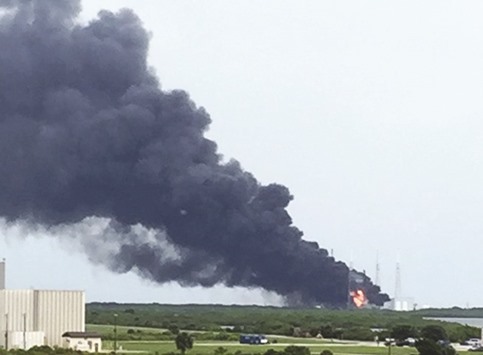An explosion destroyed a Falcon 9 rocket belonging to Elon Musk’s SpaceX and its satellite cargo during routine test firing at Cape Canaveral in Florida yesterday, two days before it had been due to blast off and place the satellite in orbit.
SpaceX said there were no injuries and that an “anomaly” during the static fire test resulted in the loss of the rocket and the communications satellite owned by Israel-based Spacecom which was going to be used by Facebook.
The large blast shook the launch pad leased by SpaceX at Cape Canaveral Air Force Station just after 9am ET (1300 GMT), sending a thick plume of black smoke pouring into the air.
Musk said on Twitter that the loss of the rocket had occurred while it was being filled with propellant and that the problem originated around the upper stage oxygen tank.
“Cause still unknown. More soon,” Musk tweeted.
It was not immediately known to what extent SpaceX’s launch pad was damaged or what the impact would be on the dozens of Nasa and commercial satellite missions on its launch schedule.
People in buildings far from the facility felt the shock waves, but local authorities said residents were not at risk.
“Heard/felt weird BOOMS this morning as SpaceX Falcon 9 rocket exploded ... thank God no injuries!” one local woman, Evie Hedman, wrote on Twitter.
Robin Seemangal, a space reporter with the Observer newspaper, quoted a source at the facility who told him it felt like the office they were in had been hit by lightning.
“We actually thought the building was collapsing, it shook us so bad,” Seemangal wrote in a tweet, quoting his source.
The Federal Aviation Administration, which oversees commercial rocket launches in the United States, will work with SpaceX to understand the cause of the accident, said agency spokesman Hank Price.
SpaceX had been due to launch its 29th Falcon 9 rocket before dawn tomorrow, carrying the AMOS-6 satellite owned by Israel’s Space Communication.
Facebook would have been among the customers for bandwidth on that satellite.
Last year, Facebook said it was partnering with Eutelsat Communications to boost data connectivity to large parts of Sub-Saharan Africa.
Yesterday’s launch pad explosion could derail the sale of Spacecom for $285mn to Beijing Xinwei Technology Group.
The companies unveiled the agreement last week, but said it was contingent on the successful launch of the satellite and completion of its in-orbit tests.
In a statement to the Tel Aviv Stock Exchange, Spacecom said that the satellite’s loss will have “a significant impact” on the company, and it would continue to provide updates about the situation.
Its shares closed down 8.9% at 38.95 shekels.
In a post from Africa, Facebook founder Mark Zuckerberg said he was deeply disappointed at the loss of the satellite which he said would have provided connectivity to many entrepreneurs and everyone else across the continent.
“We remain committed to our mission of connecting everyone, and we will keep working until everyone has the opportunities this satellite would have provided,” he wrote.
SpaceX had planned to dispatch as many as nine more missions before the end of the year, including two flights to place a 20-member satellite network into orbit for Iridium.
SpaceX, one of two companies that fly cargo to the International Space Station for Nasa, was next scheduled to take off in November for the orbiting laboratory, which flies 250 miles (400km) above Earth.
“Nasa still is assessing what impacts, if any, the incident will have on future missions,” spokesman Michael Curie said in an e-mail.
Shares of Musk’s companies Tesla Motors and SolarCity were down 4% at $203.65 and 5.5% at $19.50 respectively in morning trade.
Tesla and SolarCity are not tied financially to SpaceX and it was not immediately clear if the explosion had affected their prices.
SpaceX says it has a backlog of more than $10bn worth of launch orders from customers, including Nasa and commercial companies.
On Wednesday, it said it had signed its first customer to use a previously flown Falcon 9 rocket, but that launch was not due until later this year.
The rocket that blew up yesterday had never been flown before.
The Hawthorne, California-based company was founded by Musk in 2002 and began launching its Falcon 9 rockets in June 2010, racking up 27 successful flights and one failure in a little more than six years.
SpaceX had recovered from a June 2015 launch accident that destroyed a load of cargo headed for the space station.
Earlier this year, it successfully broke a monopoly by United Launch Alliance, a partnership of Lockheed Martin and Boeing, to win a military satellite launch contract.
The pad where SpaceX’s rocket was being prepared for launch is one of two operated by the company.
Its other site is at Vandenberg Air Force Base in California.
SpaceX also has leased one of the old space shuttle launch pads at the Kennedy Space Centre, adjacent to SpaceX’s current launch site.
A fourth US site is under construction in Texas.
Musk set up SpaceX with the goal of slashing launch costs to make travel to Mars affordable.
The company plans to fly its first unmanned spacecraft to Mars in 2018 and to send humans to the red planet as early as 2024.
Musk is expected to unveil details of his Mars programme at the International Astronautical Congress in Guadalajara, Mexico, next month.

A plume of smoke is seen after the Falcon 9 rocket exploded in Cape Canaveral.
